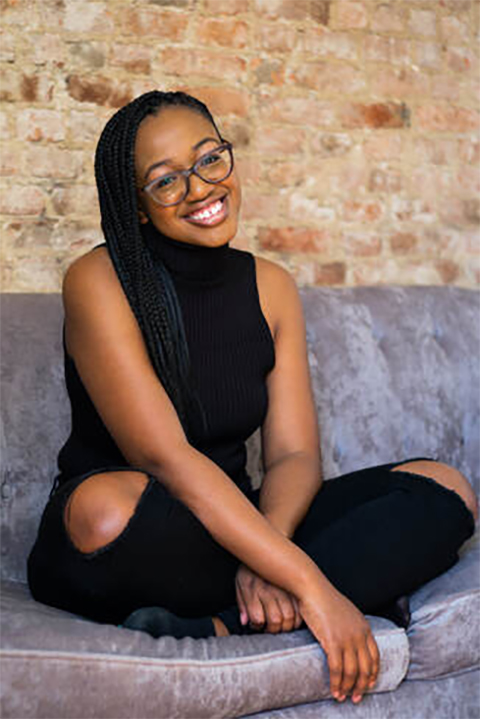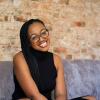Meet Teaching Artist Arriel Vinson


Arriel Vinson is a Tin House Winter Workshop alumna and Midwesterner who writes about being young, Black, and in search of freedom. She earned her MFA in fiction from Sarah Lawrence College. Her poetry, fiction, and essays have appeared in Kweli Journal, Catapult, Electric Literature, Waxwing, and others. Arriel's work has been nominated for Best New Poets 2020, Best of the Net 2019, and a Pushcart Prize. She is a 2020 92Y Discovery Poetry Contest semifinalist, a contributing editor for Catapult and Apogee Journal, and a 2019 Kimbilio Fellow.
Find Arriel's upcoming classes by visiting her artist bio.
***
When did you start teaching? What path—career or otherwise—brought you here?
I started teaching when I got involved with the Right-to-Write program in grad school, at Sarah Lawrence College. I was hired as a coordinator, and my job—along with the volunteers—was to visit the Valhalla Correctional Facility each week and teach creative writing. It was such a rich experience, giving the writers prompts and stories to read each week, learning about them and their experiences, listening to writing that should be known far and wide—but isn’t because of the prison industrial complex. That was what fueled me to continue teaching. I believe everyone deserves access to literature. I believe everyone has the spirit to be creative, and sometimes it just has to be given the space. I don’t teach full-time, but I started teaching to make an impact—and show other writers that the cannon isn’t the end all, be all.
How would you describe your teaching style?
I am the type of teacher who creates a fun but challenging and supportive environment. I give students the opportunity to question, to challenge others and myself, to add their own knowledge to a lesson. I encourage all of my students to have a voice in the (virtual) classroom and affirm them as they continue to understand the work we read and create. I just want the students to have fun with what they learn. So often, we are bored or don’t see ourselves in the work we’re learning—and that is a barrier to access. My job isn’t just to teach but to consider each student.
When it comes to imagining and creating classes, where do your ideas come from? What in particular inspires you?
I’m always inspired by writers I know: those from my MFA program, from my previous jobs and internships, but also from the lineage I believe myself to be a part of. I always, always make sure my friends’ work is in the loop somehow, whether it be reading an excerpt in class or recommending their entire novel. I also keep a list of poems that I want to dissect handy and have a million bookmarks of essays/stories I’d like to read or have already read and think are brilliant. I use the world around me as inspiration. Just a few weeks ago, I was a lead teacher for Sarah Lawrence’s Writer’s Week, and each day I used a song/album title as the theme. So on the day we were talking about love and heartbreak, I used my friend Leah Johnson’s novel, a Pablo Neruda poem, and Beyoncé lyrics to explore the elements of a love/heartbreak piece. So much of our world is other art, and I think it’s important to incorporate that.
What's the ideal environment for your classroom? What atmosphere are you hoping to establish?
I’m hoping to establish an environment where everyone feels comfortable sharing their opinions, even if it differs from the next student’s. Or mine. I always aim to have a learning atmosphere that feels fun and lighthearted even if we are analyzing, picking apart, and putting work back together. A class doesn’t have to be strict for students to learn, and I think a lot of adults forget that when teaching teens. I’m here to change that narrative.
Regardless of what your class is specifically focusing on, what's the main goal you have for your students?
My main goal is that students feel the urge to write or get ideas for what they’re already working on. I want them to just be inspired, and excited, by what we cover in the (Zoom) room. I want them to feel like they can try something new, but most of all, I want them to have the courage to do so. Writing is hard, and anyone who has the courage to come to the page, no matter how often, is already doing some of the work.
What are goals you have for yourself? These could be teaching goals, writing goals, career goals, community goals, etc.
I’m not a five-year-plan, ten-year-plan type of gal, but I make resolutions every year. I don’t have specific dates for my writing/career goals, because publishing is kind of about luck, but I plan on being a young adult author and career poet. Hopefully for the rest of my life. Hopefully full-time. And I’m going to speak this into existence, but writing will be my career. I’ve never dreamt of working a 9–5 forever—and that may be because my family is still working and probably will never retire, or it may be because I reject capitalism and the idea that we’ll spend our entire lives this way. But I know, for certain, I want to call myself a writer and a writer only.
What have been some of your own favorite educational experiences?
I recently participated in a workshop with Vincent Toro for Kweli Journal’s International Literary Festival. We played with forms and restraints in poetry, and I love that I was forced to challenge myself. I was forced to think of a form’s intent before even writing the poem, which is a bit different from my typical thinking. And I think about two years ago at Sarah Lawrence, I attended a master class with Hanif Abdurraqib where we used themes/rhythms in songs to write a piece of our own. But outside of the classroom, my favorite educational experiences are the ones I have with friends—where we’re workshopping plots aloud on FaceTime or tweaking lines of poems over the phone. All of these have pushed me, and I came out of them with something that I wouldn’t have alone. Because writing is ultimately about community and trusting someone else with your words/ideas/truths.
To you personally, what is the most important part of the literary arts?
To me, it’s that art—with our truths, with our voices—can shape society and make change. And I know that’s not everyone’s goal when coming to the page, but just look at some of the poems and stories that are still being taught today by writers like June Jordan or Lucille Clifton or Jamaica Kincaid. I love the literary arts because we can say what we want to say through our art and challenge others, or systems, as we create. And there’s space for so many types of writers. That’s the beauty of it.
Is there anything else you'd like to share?
I hope to see you all in my courses! Let's create.
